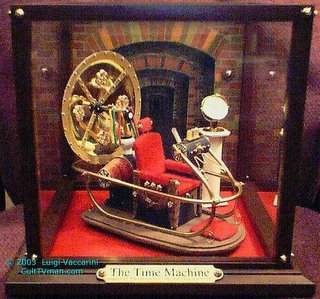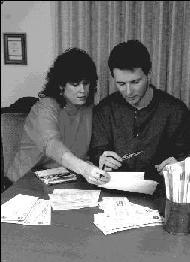 Beyond the realm of movies and fantasies, there is the real issue of the possibilities of time travel.
Beyond the realm of movies and fantasies, there is the real issue of the possibilities of time travel.
Can it really exist? IS it possible? Well, as odd and unreal as it may sound to you, even if it doesn't exist yet today, it is still possible that there are in fact, real actual time travelers living amongst us right now, since they may have come from a future time when time travel IS possible. To understand why this is true, we need to understand a bit about time travel itself. So let’s take a look.
I think most of us have, from time to time, fantasized about, or at least thought about time travel. Until about a century ago, the concept itself was so foreign that most people couldn’t even imagine what it meant, let alone think about actually doing it. But just about everyone is by now familiar with H.G Wells’ original 1888 story called “The Time Machine” and that was probably the first real introduction to the concept that most people had. There have been movies based on that book, but also, the concept originally introduced and developed by Wells has spawned and evolved into many, many other stories, from The Time Tunnel TV series, to Star Trek, from Mr. Peabody’s “Way-Back machine” to Hitchhiker’s Guide to the Galaxy, and, of course the popular Back To The Future trilogy. Since the 1950’s and 1960’s there have been so many books and movies, TV shows, etc. dedicated to the various aspects of time travel that it has become an important sub-genre of science-fiction, and by now we are all experts on the concepts. Well maybe not experts, but most people do understand the concepts of time travel and some of the problems involved – like the classic time paradox, for example: If you go back in time and do something that prevents your own birth, (Carl Sagan called this the "Grandfather Paradox") do you suddenly wink out of existence because you suddenly never existed? But then if you never existed, then you couldn’t have gone back to prevent your birth, so you WOULD have existed – but then if you DID exist, then you WOULD have gone back and….. and so the circular argument continues.
Since the 1950’s and 1960’s there have been so many books and movies, TV shows, etc. dedicated to the various aspects of time travel that it has become an important sub-genre of science-fiction, and by now we are all experts on the concepts. Well maybe not experts, but most people do understand the concepts of time travel and some of the problems involved – like the classic time paradox, for example: If you go back in time and do something that prevents your own birth, (Carl Sagan called this the "Grandfather Paradox") do you suddenly wink out of existence because you suddenly never existed? But then if you never existed, then you couldn’t have gone back to prevent your birth, so you WOULD have existed – but then if you DID exist, then you WOULD have gone back and….. and so the circular argument continues.
That, in a nutshell, is known as the classic 'time paradox', and it has to do with the recursive causality cycles caused by limitations that WE place on our understanding of how time works.
The answer to the conundrum, by the way, is that when you go back in time, you create an alternate path. So your current self, now living in the ‘past’ is unaffected by the downstream ripples of his actions, because, by definition, he has now arrived from an alternate future from the one now taking place. It’s simple really. You go back in time, you make the change, and your future self on this new timeline is never born, but your older self is still there to be reckoned with because you came from another timeline to the one you’re on now.
But, paradoxes aside, is it physically possible? In other words, is the concept of traveling in time pure fantasy? Or is it at least possible scientifically, but we simply lack the technology to perform it?
 Well, according to many physicists such as Albert Einstein, and other Relativists, yes, it is theoretically possible. Einstein was the first to introduce the concept of the passage of time being relative to other things such as mass and velocity, rather than a 'fixed' aspect of measurement of existence. Essentially, time slows as you approach the speed of light and, mathematically at least, time begins to go backward if you surpass the speed of light. But there is a mathematical rule that suggests that we cannot pass the speed of light. Yet, scientists since then have discovered particles, called tachyons, that do in fact travel faster than light.
Well, according to many physicists such as Albert Einstein, and other Relativists, yes, it is theoretically possible. Einstein was the first to introduce the concept of the passage of time being relative to other things such as mass and velocity, rather than a 'fixed' aspect of measurement of existence. Essentially, time slows as you approach the speed of light and, mathematically at least, time begins to go backward if you surpass the speed of light. But there is a mathematical rule that suggests that we cannot pass the speed of light. Yet, scientists since then have discovered particles, called tachyons, that do in fact travel faster than light.
Dr. John Gribbin, a professor of physics at Cambridge University in England, has written a number of books on the subject of how physics treats time and how time is manageable by altering certain other aspects, based on its relativity. In one of his many books, "Timewarps", published in 1979, he actually describes some mathematical models for time travel, and even goes so far as to map out causes and effects in diagram form.
 He describes several mathematical models used to illustrate how Time Travel would occur. Specifically, one of them is that if you approach a spinning black hole in space, and upon reaching the event horizon, you travel with the direction of spin, you will be ejected out in a future time compared to when you went in. And if you travel in the direction opposite to the direction of the spin of the black hole, then you will emerge at an earlier time than that at which you entered.
He describes several mathematical models used to illustrate how Time Travel would occur. Specifically, one of them is that if you approach a spinning black hole in space, and upon reaching the event horizon, you travel with the direction of spin, you will be ejected out in a future time compared to when you went in. And if you travel in the direction opposite to the direction of the spin of the black hole, then you will emerge at an earlier time than that at which you entered.
In fact, at the event horizon of a black hole, ‘space’ and ‘time’ change places, and a displacement in one effects a displacement in the other. If you simply go to the event horizon and pause and then leave, you will emerge in a different part of the galaxy or universe, since the time you spent there at the horizon was translated into a spatial displacement when you emerged. The degree of spatial displacement is relative (no pun intended) to how long you paused at the event horizon before moving away. That presents an opportunity for long distance space travel as well, if we can map out where we might end up.
 Another model involves using a mass like a large asteroid or meteor, formed into the shape of a cylinder and made to spin at close to the speed of light. Then, if you go to the center of it’s length and travel with or against the direction of spin, you will travel in time backward or forward depending on direction. Again, the parameters are similar to those of approaching the event horizon of a black hole.
Another model involves using a mass like a large asteroid or meteor, formed into the shape of a cylinder and made to spin at close to the speed of light. Then, if you go to the center of it’s length and travel with or against the direction of spin, you will travel in time backward or forward depending on direction. Again, the parameters are similar to those of approaching the event horizon of a black hole.
Obviously, there are huge technical problems involved. Not the least of which is the amount of energy required to create spinning black holes or spinning cylindrical asteroids. We would have to find these anomalies in space, rather than create them. But they may not be convenient to get to in realistic timeframes. Also, the structural stresses and strains of having a spaceship approach the event horizon of a black hole without flying to pieces or crushing beyond recognition, or stretching out like a taffy pull - are considerable. Is there another way, using technology, to do this?
Some say that we have, in fact, already done it.
The First Time Travel Experiment
 The so-called Philadelphia Experiment was actually called the Rainbow Project at the time and was led by Dr. John Von Neumann. In an experiment carried out August 12, 1943 it was reported to have caused the U.S.S. Eldridge, a US Naval warship with a skeleton crew of 33 on board, to become invisible and disappear entirely from Philadelphia harbor, and suddenly re-appear on August 12, 1983,in Norfolk Virginia harbor, hundreds of miles away and 40 years in the future. It was reportedly there in that harbor for a few hours, until someone went out alone in a small boat with a special toolbox, and shut down an electromagnetic field generator on board, which then caused the ship to disappear again and reappear back in 1943 in its original position.
The so-called Philadelphia Experiment was actually called the Rainbow Project at the time and was led by Dr. John Von Neumann. In an experiment carried out August 12, 1943 it was reported to have caused the U.S.S. Eldridge, a US Naval warship with a skeleton crew of 33 on board, to become invisible and disappear entirely from Philadelphia harbor, and suddenly re-appear on August 12, 1983,in Norfolk Virginia harbor, hundreds of miles away and 40 years in the future. It was reportedly there in that harbor for a few hours, until someone went out alone in a small boat with a special toolbox, and shut down an electromagnetic field generator on board, which then caused the ship to disappear again and reappear back in 1943 in its original position.
But when it re-appeared, many of the crew were dead or dying. Some were 'melted' into the deckplates, theoretically because the strong electromagnetic fields created by the generators disturbed the natural cohesion of the electromagnetic nuclear bonds that hold matter itself together. So when the ship’s deckplates and the sailor’s bodies all started to lose their molecular and atomic cohesion, they literally melted together, like two ice cream cones on a sidewalk in the sun.
This is a controversial subject because it is outside the normal daily experience of most people, but there are many people who were involved who swear it is true.
In WWII, the US Navy was interested in developing a way to degauss the metal hulls of American warships to prevent them from being detected by German U-boat radar. Conceptually, they were trying to create an ‘electromagnetic bottle’ around the ship, that would deflect enemy radar around the ship. They had found a way to do this using electromagnetic field generators mounted in a large garage, but it was unworkable at sea. They had to find a way to do this at sea and with keeping a full crew on board at the time. So Nikola Tesla was brought in, and he worked on the math of it, and came up with the formulas, the cycle times, and the idea of having an EM field transmitter on the ship, and then 3 other transmitters on three other ships surrounding the ships, and they would be synchronized and start rotating the field in the opposite direction from the one on the central ship. Two spinning fields, one inside the other. This is what was used, and this is what produced the reported results.
Although they only intended for the ship to become radar-invisible, the experiment had the unintended effect of making it physically invisible (completely transparent), and then removing it from the space-time continuum altogether. Electromagnetic fields are difficult to work with. Since the very nature of matter itself is held together and even formed that way into the basic elements, when you create EM fields of sufficient power, it’s difficult to predict what might happen.
There are a number of books and movies made about this now-famous experiment. Dr. Von Neumann, was reported to have died in 1958, however, I have read that he was recognized living under a different name in 1983 by author Preston Nichols buying used scientific equipment in upstate New York. The researcher suggested that he had been relocated by the witness protection program after his work on the Manhattan Project. In any case, he was an adult in 1943, and quite old in 1983, so he is most likely dead now.
So there are some who say that THAT was the first time travel experiment, even if time travel was not the intended outcome.
The Second Time Travel Experiment
There are two books written by Preston B. Nichols and Peter Moon called “The Montauk Project, Experiments in Time” and “Montauk Revisited, Adventures in Synchronicity”, that describe a six year experiment carried out from about 1977 to about 1983 in an abandoned WWII Army Air Force base on Montauk Point, Long Island, with the deliberate intention of creating a time travel capability. This was based on study and research that began after the original Rainbow Project back in the late 1940’s and continued up through the decades to the 1970’s and concluded in 1983 when the project was shut down.
This is a long story and so I will spare you the details, but suffice it to say that people who say they were there purport that time travel experiments were in fact conducted successfully during those 5 years. Some with very surprising results both from the past and from the distant future. Some stretching back to the time of Jesus Christ, and forward to the time of a science colony on Mars, and even much further forward than that even to an abandoned city in the year 6037. Also, they ran into another time traveler using another method to travel. It is an interesting story, if at times too unbelievable to repeat here.
You can still see the large radio antenna used in the experiments, if you park at the lighthouse at Montauk Point, Long Island. Years ago, there were two military teams brought in to clear the base, remove sensitive equipment, and seal the underground passages with cement. The base is supposedly abandoned now, but several years ago, video cameras were mounted on the roof of the main building for unknown reasons. There were many underground portions to the facility. To this day, park rangers do patrol there and keep visitors out. Public access to the facility is prohibited.
The Logical Point
I may go into more detail some other time about Montauk Point experiments, but for now, for argument’s sake, let’s just assume that they did NOT happen. Let’s also assume that the Philadelphia Experiment did NOT cause time travel. Let’s just assume that we do not yet have the technology to perform this feat.
Knowing that it IS scientifically possible however, how long do you suppose it will take to create the technology to catch up to the science? If it’s true that our overall knowledge doubles every 18 months, then will we know how to travel in time 18 months from now when we know twice as much as we do now? What about 3 years from now, when we know four times as much as we do today? How about 30 years from now? Imagine how much more we’ll know in 50 years. What about 100 years? Will we have mastered this technology by then?
The simple logical fact here is that no matter WHEN we develop the technology to travel in time, we will then have the ability to travel back to NOW. Whether it takes 50 years or 500 years – people from that time could still come here and could still be here with us now, because of the very nature of time travel itself.
THIS is why the statement at the top of this article is true. If it EVER becomes possible for people to perform time travel, then it is probable that they are here among us today. In fact, the only way that it would impossible is if the secret is NEVER discovered and the technology is NEVER created in all the future time of mankind. Realistically, how likely is THAT?
Why Here, Why Now?
Why would people come to this period? Well, imagine going back to, say 1920. There were few telephones, no computers, no television, radio was limited, no air conditioning. I personally think air conditioning is a very key factor. To be constantly uncomfortable for half of the year, every year, would make it very unattractive to go to that time. We take it for granted now because it's just part of the infrastructure we've become accustomed to, but to go back to a time before it, would be difficult for us now.
Also, if the goal were to bring advanced techniques or technologies back to an earlier time to profit from that, the infrastructure was simply not in place in those early days to allow that. Most time travelers would choose a time after world war II finished in 1945. The good times began after then. TV came out, air conditioning was invented and became more and more available, cars were available for most people, life became livable here for modern people.
Why wouldn’t they go back to say 2010 or later? Well, due to terrorist threats and the increasingly hostile dangerous world we live in these days, soon there will be a national database with all our identities encoded and encrypted for easy tracking of all our activities. It will soon be virtually impossible to exist in this world without being in the database and encoded. A visitor from the future could not possibly just blend in with no background info about where he came from, credit history, health history, legal history, etc. The visitor would be noticed, and branded as an illegal alien and sent out of the country, or possibly imprisoned. That would defeat the purposes for coming back to this time.
So the prime time to arrive in Earth’s history, all things considered, is probably the last 60 years or so. After air conditioning, TV and computers and after the last world war, but before the next terrorist war, and the Big Database days of having everyone’s lives visible all the time to the ‘authorities’.
How Could We Tell?
Well, since these visitors might want to use their advantage of knowledge about future technology to benefit themselves here and now, we would probably see a burst of innovation in technology and products that would be unprecedented in previous earth history. Have we seen that in the last 60 years? Would you say that we have somehow managed to invent more new technologies in the last 60 years than in any previous 60 year period preceding that?
Unquestionably.
Then there might be sightings of small spaceships for another thing. This needs to be explained.
Unlike H.G. Wells’ fantasy story about time travel, real time travel would not work that way. For example: His machine showed the passage of time in that one spot where the machine stayed through the days, weeks, seasons, years, centuries, then even millennia.
In reality, what do you suppose you would see around you if you were to suddenly zap back in time 1 single hour? The room you’re in one hour ago, with you at your desk about to read this article? No.
That's because the room you are in was not 'here' an hour ago.
You would see the black void of space filled with billions of stars. The reason is that the Earth travels at 68,000 miles per hour through space. It simply would not be in this location yet for another hour. An hour ago, it was 68,000 miles away rushing to get here, and an hour from now, it will be 68,000 miles further along on it’s trip around the sun.
So, when calculating time travel, you would want to take physical location into account. You must get out into space through a polar escape vector (to be off the ecliptic plane) then, travel back or forward in full year increments, so you’ll be arriving around the time the Earth is zooming by this neighborhood of space, then you’ll want to catch up with it and land.
To do this, you’ll need a spaceship. Nothing large, though. You won’t be traveling that long, so you don’t need years of food or anything. A small craft would do. But it would be more advanced than 20th century technology because it’s from their future. It probably can turn quickly in mid-air, so a traditional jet shape is out of the question. The pointed, one-directional fuselage, and one-way wings wouldn’t work for a craft that could suddenly face a different direction. You’d need a craft that is all wing, and not one-directional - circular, essentially, and have, not a point, but a narrow, tapered edge all the way around. Sort of saucer-shaped.

Can you think of any possible sightings of ships like this in the last 60 years following WWII? Say from 1947 on? Small, circular craft thicker in the middle, tapered to a point all around the edge? Does this ring any bells for you? Does this picture look like anything familiar to you?
So, after a little logical analysis, it seems entirely possible that there could be some people from a future time with us right now. Do you know anyone that seems a little more advanced than your other friends? Someone with more knowledge or insights than others? How much do you REALLY know about their past? Could the past they told you about simply be a convenient cover story? Could they be a traveler?
Wouldn't you love to ask them questions about the future? If so, what would you ask?
















